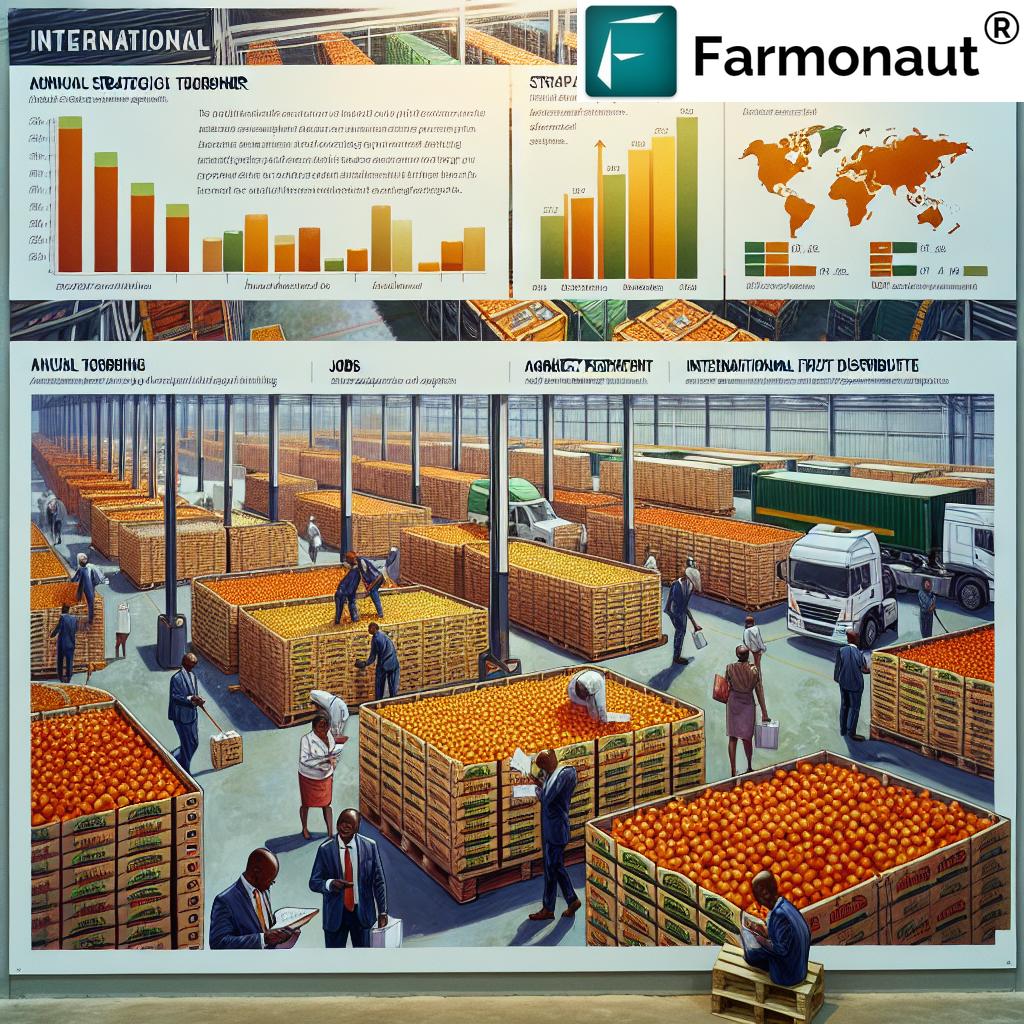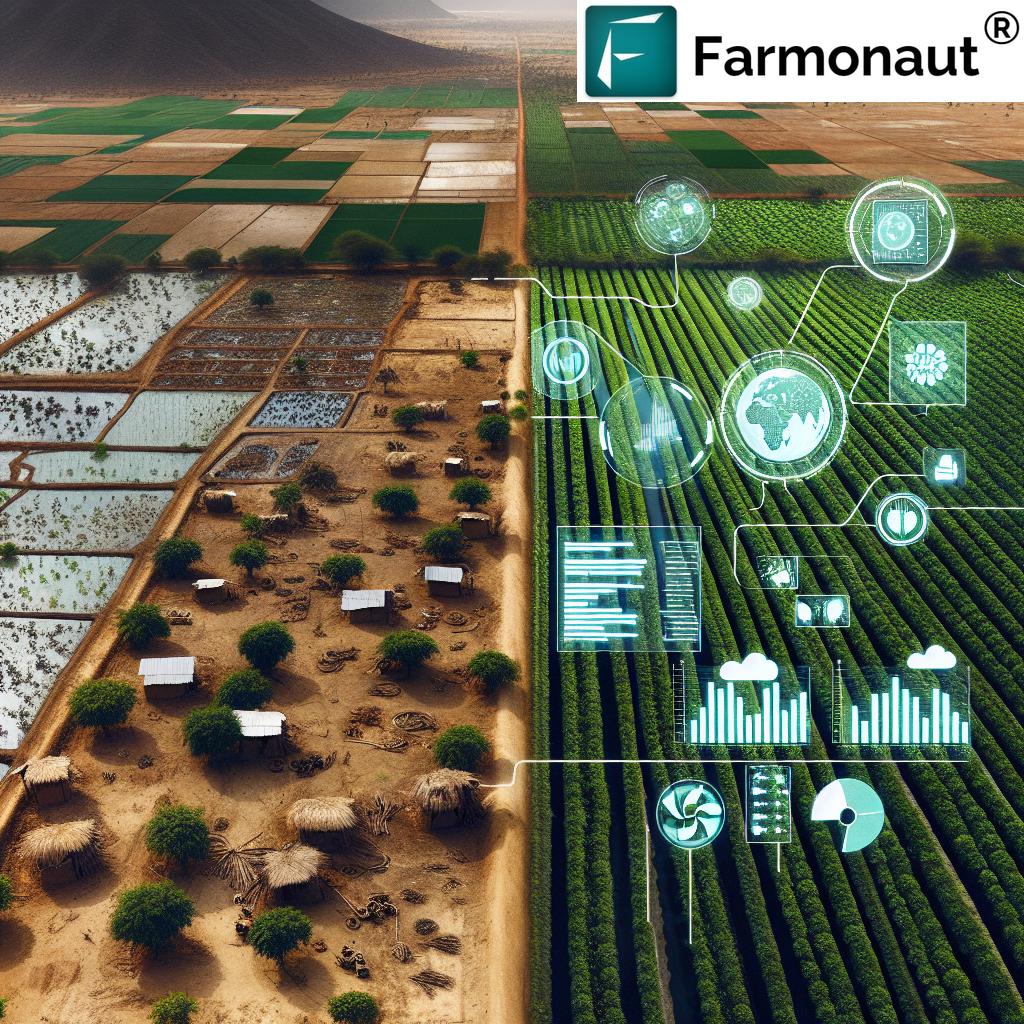Botswana Citrus Industry: $12M Boost Powers Global Expansion
“Botswana’s citrus industry received a $12 million investment, accelerating its expansion into international markets.”
Table of Contents
- Botswana Citrus Industry Overview
- $12M Stake Sale: The Game-Changing Deal
- Economic Impact: Expansion, Jobs & Exports
- International Markets & Industry Trends
- Deepening Botswana’s Agricultural Footprint
- Farmonaut’s Role in Large Scale Citrus Farming & Agribusiness
- Year-on-Year Export Growth & Economic Impact Table
- Future Outlook & Strategic Agricultural Development
- FAQ – Botswana Citrus Industry & Farmonaut
Botswana Citrus Industry Overview
The citrus industry in Botswana stands at the threshold of transformative growth. Already recognized for its strategic approach to agricultural development in Botswana, the sector is rapidly evolving from a localized initiative to one with an increasing presence in international markets. As the world’s appetite for quality citrus produce grows, Botswana is leveraging robust investments and partnerships to position itself as an emerging powerhouse in the global fruit sector.
The recent $12 million capital injection—a major deal finalized by Selebi-Phikwe Citrus (SPC)—marks a significant new chapter in this journey. This boost not only supports the on-ground expansion of large-scale citrus farming but also enhances our capacity for global fruit distribution, job creation, and sustainable economic impact. Through this commitment, Botswana sends a clear message: we are invested in the future of agro-industries, jobs created in agriculture, and a competitive presence in export citrus produce.
In this comprehensive overview, we unpack the implications of this $12 million investment, explore the dynamics of Botswana’s citrus industry, and highlight strategic opportunities for local and global stakeholders alike. Our mission is to provide authoritative insights into current industry trends and innovative solutions driving the region’s expansion in today’s agribusiness sphere.
Key Players in Botswana’s Citrus Sector
- Selebi-Phikwe Citrus (SPC): The flagship project leading agricultural transformation in eastern Botswana, focusing on export-oriented citrus farm operations.
- Citrico Global: A European agricultural giant, farming over 30,000 hectares worldwide and distributing more than one million tonnes of produce across 70+ countries annually; key for global market access and knowledge transfer.
- Zapemm B.V. & Ramachandran Ottapathu: Principal SPC shareholders underscoring international and local investment confidence.
“The recent boost in Botswana’s citrus sector is projected to significantly increase export volumes and job creation.”
$12M Stake Sale: The Game-Changing Deal
At the heart of this unfolding agricultural revolution is the $12 million strategic deal between Selebi-Phikwe Citrus and Citrico Global. According to public records, SPC’s ownership distribution is as follows:
- Zapemm B.V.: 75.58% stake (majority ownership, emphasizing international confidence)
- Ramachandran Ottapathu: Remainder (indicative of local business acumen and commitment)
The transaction is focused on the sale of a 33% stake to Citrico Global, empowering SPC to harness the global fruit network of this European player. This move delivers more than just capital—it opens new doors for Botswana citrus industry expansion, international markets penetration, and scalable export opportunities.
Citrico Global’s Credentials Include:
- 30,000+ hectares of farmland worldwide
- Distribution of over one million tonnes of citrus produce annually
- Presence in 70 countries
- 12,000 employees, demonstrating operational scale
- Annual turnover of around €1 billion
This powerful stake sale will catalyze the expansion of existing operations and the establishment of a second large-scale citrus farm in Botswana, reinforcing the nation’s goal of creating a self-sustaining, export-oriented agro-sector.
-
“Market access and route-to-market are crucial in our industry.”
This statement from SPC underscores the focus on leveraging Citrico Global’s established marketing and distribution networks for global reach and reliable customer base development.
Economic Impact: Expansion, Jobs & Exports
The economic impact of this capital inflow is multifaceted, driving the expansion of farming operations, scaling up international market presence, and propelling widespread economic empowerment across the region.
1. Agricultural Development & Job Creation
- Expansion and Modernization:
The investment enables the mirroring of SPC’s current large-scale citrus farm, doubling annual output and providing a foundation for future agro-processing industries to thrive. - Jobs Created in Agriculture:
Hundreds of direct employment opportunities will be generated for local communities—as well as indirect jobs supporting value chains, logistics, and rural economies. This is central to Botswana’s vision of inclusive agricultural development.
2. Export Citrus Produce: Gateway to International Markets
- Expanding Operations in International Markets:
Access to Citrico Global’s networks means Botswana now has a pathway to premium markets in Europe, Asia, and the Middle East for its high-quality citrus produce. This not only increases revenue but also enhances our industry’s reputation in the global agricultural sector. - Boost to Exports:
Citrus export volumes are set to rise substantially. In the past, export revenue was limited by scale and connections; with this partnership, economic indicators will continue trending upwards (see data table below).
3. Value Chain Transformation
- Agro-Processing & Support Industries:
The expansion of citrus farming underpins the development of supporting industries—including packaging, cold storage, logistics, and potential food manufacturing—further multiplying the economic benefits. - Local Communities & Rural Economies:
As new jobs and agencies are created, there will be increased competitiveness and improved standards of living for workers and smallholder farmers, fostering sustainable growth from the ground up.
International Markets & Industry Trends
The ability to operate and compete in global fruit distribution hinges not just on productive capacity but on understanding international regulations, consumer preferences, and technological adaptation. The Botswana citrus industry is now poised to integrate with these global trends, driving transformative change throughout the agribusiness sphere.
Market Access, Distribution, and Customer Base Expansion
- With the backing of Citrico Global—a major player in the fruit sector—the Botswana citrus industry now enjoys unprecedented market access, enabling efficient distribution across multiple countries and continents.
- The route-to-market now includes robust links to the European Union, Asia, and evolving middle-income nations seeking reliable fresh citrus suppliers.
- SPC, through its new network, benefits from an established customer base and industry expertise, setting new standards for quality control, certifications, and logistics efficiency.
Deepening Botswana’s Agricultural Footprint
Agricultural development in Botswana is now being redefined by large capital inflows, global-market orientation, and the rise of precision-driven citrus fruit farming. The commitment from both local and international investors demonstrates high confidence in the region’s potential and future.
As noted in statements from SPC’s board and stakeholders:
-
“We are not going anywhere. In fact, we are investing further. Many hundreds of jobs will be created, Botswana’s exports will rise, and eventually, agro-processing and supporting industries will follow.”
This charge to “deepen the footprint” of Botswana citrus industry on the world stage requires scalable solutions—for farm management, resource optimization, and sustainability tracking—catalyzed through modern agritech tools.
Farmonaut’s Role in Large Scale Citrus Farming & Agribusiness
To fully realize the potential of large scale citrus farming, we must harness advanced technologies that optimize every hectare for productivity and sustainability. Farmonaut, as a pioneering agricultural technology company, plays a pivotal role in supporting the expanding operations of Botswana’s evolving citrus sector.
Innovative Technologies for Modern Farms
-
Satellite-Based Crop Health Monitoring:
Farmonaut delivers real-time health data on vegetation (NDVI), soil moisture, and pest risks—direct to farmers’ mobile or web devices. This empowers citrus growers to make informed irrigation and input decisions for higher yields and reduced waste across thousands of hectares. -
AI-Powered Jeevn Advisory System:
Our AI analyzes environmental and on-ground data to provide actionable crop management advice—improving efficiency, disease control, and resource allocation for both smallholders and large agribusinesses. -
Blockchain-Based Product Traceability:
Compliance and transparency are fundamental for international markets. Farmonaut’s Traceability Solution enables traceable, secure journeys from citrus farm to export dock, strengthening trust with overseas customers and regulators. -
Fleet and Resource Management:
Effective operations across expansive citrus farms hinge on optimized logistics. Explore Fleet Management Tools for streamlined vehicle and equipment allocation, reducing costs and boosting productivity. -
Carbon Footprinting for Sustainable Growth:
International buyers increasingly require evidence of environmentally responsible practices. Farmonaut’s Carbon Footprinting module helps agribusinesses monitor emissions, track improvements, and align with global sustainability benchmarks—essential for maintaining market access in Europe and beyond. -
API Integration & Developer Resources:
For enterprise buyers and agritech partners, Farmonaut’s public API enables integration of up-to-date satellite and weather data into existing dashboards and third-party applications. See API documentation here.
Broad Target Audience
- For Large Agribusinesses: Integrated solutions scale seamlessly—from single-farm monitoring to multi-hectare citrus plantation oversight.
- For Smallholder Farmers: Affordable, mobile-first tools enable digital transformation and improved returns from export-quality horticulture crops.
-
For Export Managers & Governments:
Use cloud dashboards and real-time statistics for monitoring, planning, and regulatory reporting—critical for meeting export quotas and supporting agricultural partnerships.
Interested in crop loan and insurance verification for citrus and other export crops? Learn how satellite-based crop proofing speeds up finance access and minimizes fraud risk on our Crop Loan & Insurance page.
To manage very large orchards over several locations in Botswana, our Large Scale Farm Management solution delivers centralized updates, remote sensing, and easy reporting tailored for citrus fruit farming.
For governments, agribusinesses, and researchers monitoring plantations, consult our Crop / Plantation / Forest Advisory solutions.
Year-on-Year Export Growth & Economic Impact Table
The impact of the $12 million investment and new agricultural partnerships is evident in rapid export growth, rising revenue, and job creation within the Botswana citrus industry. The table below summarizes these trends for recent years, based on available industry estimates.
| Year | Citrus Export Volume (Metric Tons) | Export Revenue (USD Million) | Jobs Created | Major Export Destinations |
|---|---|---|---|---|
| 2021 | 11,000 | 7.2 | 230 | South Africa, Italy |
| 2022 | 15,500 | 9.1 | 340 | Italy, Germany, UAE |
| 2023 | 20,000 | 11.5 | 470 | EU, Middle East |
| 2024* | 27,500 | 15.8 | 610 | EU, Asia, Middle East |
*2024: Projected values post $12M investment and expansion. Source: Industry estimates, public records.
Future Outlook & Strategic Agricultural Development
- Further Expansion: Discussions with the government are underway to secure land and incentives for the upcoming second large-scale citrus farm. This will more than double national output and expand our reach across continents.
- Broader Value Chain Development: A flourishing citrus sector pulls along downstream industries—agroprocessing, packaging, logistics—spurring rural industrialization and skills transfer.
- Investment Opportunities: The success of SPC’s capital raise signals robust agriculture investment opportunities in Botswana, both for local and international investors committed to economic transformation.
- Technological Integration: Ongoing adoption of satellite-based monitoring, AI-driven advisory, and blockchain traceability will be pivotal for maintaining quality assurance, enhancing yields, and meeting strict international standards.
- Sustainability and Compliance: To maintain global competitiveness, our farms must invest in measurable sustainability practices (e.g., carbon footprint monitoring) and transparent, ethical supply chains (traceability).
Navigating a New Era for Botswana Citrus Industry
The $12 million boost is not just a financial transaction—it’s an inflection point for Botswana’s agricultural sector, setting new benchmarks for operational excellence, global outreach, and local value addition. With visionary partners and technology-driven strategies, the Botswana citrus industry is poised for resilient, inclusive, and scalable growth.
For stakeholders, the road ahead is clear: invest in innovation, build global relationships, elevate quality, and ensure sustainable, transparent agricultural development in Botswana.
Ready to modernize your agribusiness workflow? Access Farmonaut’s platform for smart, scalable farm and resource management solutions on Android, iOS, or web.
FAQ – Botswana Citrus Industry & Farmonaut
What is the significance of the $12M investment in Botswana’s citrus sector?
The $12 million capital provided by the stake sale to Citrico Global is a landmark for Botswana’s citrus industry. It funds the expansion of farm operations, supports job creation, accelerates export citrus produce, and strengthens Botswana’s position in international markets.
How will jobs be created in agriculture through this deal?
Expansion of citrus farms and supporting industries (logistics, agro-processing, technology) will generate hundreds of direct and indirect job opportunities. This aligns with the national goal of inclusive rural development and economic diversification.
How does Farmonaut support citrus fruit farming and export operations?
Farmonaut provides satellite-based monitoring, AI-driven advisory, blockchain traceability, and resource management tools for farms of all sizes. This ensures better yields, compliance with export standards, and operational efficiency across all hectares farmed.
What are the key international markets for Botswana citrus exports?
Botswana’s citrus produce is distributed to markets in the European Union, Middle East, Asia, and Southern Africa. Access to Citrico Global’s networks greatly enhances this reach and assures stable, premium market channels.
What are the main benefits of agricultural partnerships and investments in Botswana?
Large-scale investments and international partnerships support the creation of modern farming infrastructure, uplift local economies, transfer skills and technology, and provide entry into high-value global agricultural value chains.
How do I get started with Farmonaut’s platform?
Simply download the app for Android or iOS, access the web application, or request integrated API solutions for large agribusiness and government programs.
Conclusion: Botswana’s Citrus Renaissance
The ongoing advancements in the Botswana citrus industry exemplify the power of targeted investment, robust agricultural partnerships, and the adoption of precision agritech solutions. From expanded operations in international markets to sustainable farm management and innovative value chains, our sector is a blueprint for resilient, future-ready agricultural development in Botswana. With continued stakeholder commitment and technology-driven operation models, Botswana is set to become a major player in global fruit distribution—benefiting farmers, workers, businesses, and the nation at large.
Be part of this agricultural transformation—leverage Farmonaut’s technology to optimize your farming operations, ensure transparency, and foster lasting success in global agriculture.


















